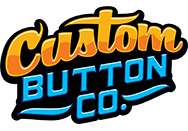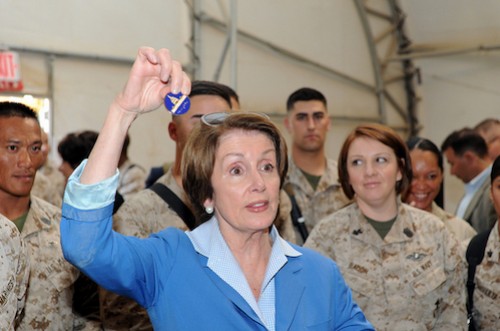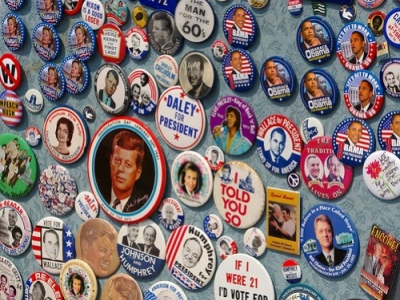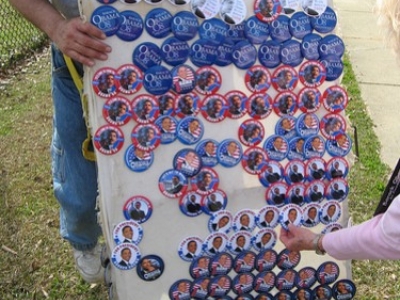Politicians have used slogans for ages. Some are clever while others are ... not so good.
We hear that politicians out there are in urgent need of inspiration for their upcoming campaigns. Politics are supposed to be one of the three taboo topics you never discuss, but hey, we're not afraid to boldly go where some won't. Here are 40 clever, ridiculous, funny, and catchy campaign slogans to get your juices flowing.
Examples of Successful Funny Campaign Slogans
1."A chicken in every pot. A car in every garage."
This gem by Herbert Hoover, the Republican presidential candidate in 1928. At the time, people were obsessed with having a chicken as a pet, but they got too obnoxious so they kept them in their pots. I just can't figure out why Hoover fought so hard for a luxury item.
2. "All the way with LBJ."
This one is Lyndon Johnson's 1964 campaign slogan. Ah, clever. Sexual innuendo and rhyming. Rhyming always makes a slogan better!
3. "Blaine! Blaine! James G. Blaine! Continental liar from the state of Maine!"
See, what did I say about rhyming? In 1884, supporters of presidential candidate Grover Cleveland were known to chant this slogan in reference to his opponent.
4. "Don't swap horses in midstream."
This was Abraham Lincoln's famous campaign slogan in 1864. Basically it just means to stick to your guns; don't abandon your position part-way through a campaign. This is stating to sound like a bad Western-softcore crossover, but compared to the next slogan...
5. "Don't switch Dicks in the middle of a screw."
Look, I'm not making this stuff up. Sexual innuendo was real classy back in those days too. This one has got a nice rhythm to it. George McGovern's supporters came up with this slogan in opposition to President Richard Nixon.
6. "Hoo but Hoover?"
Take a wild guess at whose slogan this was. That's right, it was Jefferson's! Just kidding. It was Presidential candidate Herbert Hoover's weird slogan from 1928.
7. "I like Ike."
If you want a good campaign slogan, remember this: you've got to be able to chant it. Even better if it rhymes, as we've already established. This is one of the most famous slogans of all time by Dwight. D Eisenhower in the 1952 and 1956 presidential elections.
8. "I propose a new deal."
This one reminds me of a certain game show. Hmm... Wheel of Fortune? The Price is Right? No, that's not it... Anyway, this was Franklin D. Roosevelt's slogan from the 1932 presidential campaign.
9. "I'm just wild about Harry."
If all else fails, find a song lyric with your name in it. That'll work. This was Harry Truman's slogan in the 1948 campaign.
10. "He kept us out of war."
Pointing out the obvious is a favorite pastime of many famous Americans, like John Madden, for example. This was Woodrow Wilson's to-the-point slogan in 1916.
11. "He proved the pen mightier than the sword."
Here's a little bonus slogan, again from Woodrow Wilson. He's got mad skills if he can bring a pen to a swordfight and prove it mightier!
12."Keep cool and keep Calvin Coolidge."
This just isn't fair, you know? If you've got the word 'cool' in your name, you're automatically awesome. If you don't, then change your name. Immediately. This, of course, was Coolidge's barely-remembered slogan in the 1924 presidential race.
13. "Let's get another deck", "Let's make it a Landon-Slide", "Life, Liberty and Landon."
These were Alfred Landon's clever campaign slogans in the 1936 presidential campaign. He didn't find much success with them though. Moral of the story? No innuendo, no rhyming, no rhythm, no presidency.
14. "Peace and Prosperity."
This slogan was used by Dwight D. Eisenhower in the 1956 presidential campaign. It is remembered as one of the most successful and phonetically pleasing slogans, but if you're not first to it, you're just a rotten egg!
15. "Pour it on 'em, Harry!"
This slogan barely even makes sense, and it could be misconstrued as innuendo. Perhaps this is where Def Leppard got the idea for that exotic dancer song. This masterful slogan was Harry S. Truman's in 1948.
16. "Ross for boss."
Now this is what I'm talking about! It rhymes, and it's got great rhythm too. This was H. Ross Perot's well-remembered 1992 presidential campaign slogan.
17. "Washington wouldn't, Grant couldn't, Roosevelt shouldn't."
This slogan was used in opposition to Franklin D. Roosevelt when he attempted to run for an unprecedented third term in office. Wouldn't, couldn't, shouldn't. It doesn't have great rhythm, but it gets points for stringing three similar words together.
18. "Better a third term than a third-rater."
Evidently Franklin D. Roosevelt - who was running for a third term - didn't think much of his opposition in the 1940 presidential campaign. Here's a great example of using insult to your advantage.
19. "We Polked you in '44, we shall Pierce you in '52."
Nicely done! This slogan doesn't necessarily have great chanting potential, but it rhymes, it uses innuendo, and it makes clever use of names. Franklin Pierce used this slogan in his 1852 campaign, referring to former President James K. Polk.
20. "Give 'em Hell, Harry!"
This was Harry Truman's slogan in 1948. It is remembered fondly by many presidential historians. I see what you did here. Irony. Very clever.
21. "Four more years of the full dinner pail."
This slogan was used by William McKinley in the 1900 presidential campaign because the economy was booming. It's fun to consider what today's equivalent might be... "Four more years of fast food and obesity", maybe?
22. "Are you better off than you were four years ago?"
It sounds like this one could be related to the last, but it was Ronald Regan that used this slogan in 1980. If there's any lesson to be learned here, it's that you should refer to the length of "terms" often.
23. "Back to normalcy."
Warren G. Hardy used this slogan while running for president in 1920 after the First World War. Appeal to the people through current events and circumstances. Duh.
24. "We are turning the corner."
The Great Depression was in full swing when Herbert Hoover used this slogan in the 1932 presidential campaign. Say something vaguely hopeful (but not too optimistic) about the future, and the people will love you.
25. "Go clean for Gene."
This was presidential candidate Eugene McCarthy's slogan in1968. It rhymes; you have to give it that. By going clean, was he referring to the substantial Hippie culture in the 60s?
26. "Grant us another term."
At times, you might find it helpful to overstate the obvious. This simple slogan was Ulysses S. Grant's in 1872, in his re-election campaign.
27. "Ma, Ma, where's my Pa?"
This is another famous presidential anti-slogan used by supporters of candidate James Blaine against Glover Cleveland. Cleveland, incidentally, had an illegitimate child. This one has great rhythmic and chanting potential.
28. "In your heart, you know he's right."
This was presidential candidate Barry Goldwater's campaign slogan in 1964. If you don't think this is overly clever, trust me it's about to pay off...
29. "In your guts, you know he's nuts."
Great retort. I know it seems redundant at this point, but notice how it rhymes. This slogan was used by Goldwater's opponents in '64, of course.
30. "It's time to change America" and "It's the economy, stupid."
Any Clinton fans out there? These slogans were used in a successful presidential campaign by Bill Clinton in 1992. He was able to use the economic recession to his advantage by pointing out the need for change. And he also got away with insulting everyone in the process, stupid.
31. "A time for greatness" and "We can do better."
Sometimes the best slogans are the simple ones. These were John F. Kennedy's successful presidential slogans.
32. "Grandfather's hat fits Ben."
In 1888, Benjamin Harrison, grandson of former President William Henry Harrison, used this slogan. So, morale of the story, go back in time and make your granddad the president, then wear his hat.
33. "Sunflowers die in November."
This is an awesome burn by Franklin D. Roosevelt. 1936 Presidential candidate Alf Landon was from Kansas, where the state flower was and sill is the sunflower. Crafty.
34. "No fourth term either."
Willkie is kind of the modern-day Kramer. He burst in the room, said what he wanted to say, and then left. This was his anti-slogan in the 1940 presidential campaign, but it doesn't end here...
35. "There's no indispensable man" and "Roosevelt for Ex-President".
Willkie had more than one anti-slogan. He didn't win the election, but his wit was sharp. There's more...
36. "We want Willkie" and "Win with Willkie."
Though he may not have emerged victorious, these slogans feature great use of alliteration and they're very rhythmic besides.
37. "Morning again in America."
President Ronald Reagan used this slogan when he ran for re-election in 1984. People found the peaceful, everyday esthetic appealing. Too bad they still had to hit the buzzer in the morning to go to work.
38. "Bozo and the pineapple."
The opponents of presidential and vice-presidential candidates Gerald Ford and Bob Dole were said to have referred to them as Bozo and pineapple in 1976. One has to wonder what would happen if a clown juggling pineapples did indeed run for president...
39. "Change we can believe in" and "Yes we can."
These should be pretty fresh in your mind. They were Barack Obama's 2008 presidential campaign slogans. Change is constant, so it's not that hard to believe in.
40. "Country first."
Obama's Republican opponent John McCain used this slogan in 2008. Who needs change? Think of the country!
FAQs About Campaign Slogans
What makes a campaign slogan memorable?
A memorable campaign slogan typically possesses brevity, catchiness, and a clear message that resonates with the electorate.
The most effective slogans, such as the famous "I Like Ike" by Dwight D. Eisenhower or "Yes We Can" by Obama are concise, easy to remember, and often include elements like alliteration.
They are examples of voting slogans that rhyme, demonstrating how catchy campaign slogans can become a significant part of a candidate's identity. These catchy slogans encapsulate the essence of a candidate's campaign or political stance in a few impactful words, making them stick in the public's memory.
How can humor in slogans backfire?
While humor can be a powerful tool in campaign slogans, it can backfire if it comes across as insensitive or inappropriate. Humorous slogans like "Don't switch Dicks in the middle of a screw" might grab attention, but they can also detract from a candidate's perceived seriousness or professionalism.
This highlights the risks involved in using funny political slogans or funny campaign slogans. If the humor offends a significant portion of the electorate, it can do more harm than good to a campaign.
Are funny slogans effective in serious political climates?
In serious political climates, funny slogans can provide a breath of fresh air and help humanize a candidate. However, their effectiveness largely depends on the timing and context.
Even in these climates, clever campaign slogans that incorporate humor can be impactful if they strike the right chord with voters. If used appropriately, they can lighten the mood and make a candidate more relatable, but if used insensitively, they can appear tone-deaf or disrespectful.
How do social media trends influence campaign slogans?
Social media trends have a significant impact on campaign slogans in the 21st century. Slogans that are catchy and hashtag-friendly, like "Make America Great Again," tend to perform well on social media platforms.
The rise of catchy political slogans and good campaign slogans in the digital age shows the importance of adaptability and relevance in political messaging. The viral nature of social media means that a good slogan can gain widespread recognition quickly, but it also means that any negative reactions can spread rapidly.
Can a slogan change the public perception of a candidate?
Absolutely. A well-crafted and clever slogan can significantly alter the public's perception of a candidate.
Famous campaign slogans have historically played a role in defining candidates and their campaigns. It can highlight a candidate's strengths, underscore their political stance, or even reshape their public image.
An official slogan like "Change we can believe in" helped frame Barack Obama as a candidate of hope and progress, impacting his public perception of strong leadership in the United States positively. Franklin Delano Roosevelt's campaign slogan, "A New Deal for the American People," stands as a prime example of a powerful and impactful slogan.
The Future of Humor in Political Campaigns
As we move forward, the role of humor in political campaigns, especially in slogans, is likely to evolve but not diminish.
In an age where social media plays a pivotal role in shaping public opinion, catchy and funny campaign slogans will continue to be a crucial tool for engagement.
However, the challenge will be to balance humor with the seriousness of the political message, ensuring that the wit enhances rather than overshadows the candidate's core message.
The future of political campaigns may well hinge on the ability to strike this delicate balance, using humor to connect with voters while maintaining the gravitas expected of political leaders.

 Making Buttons for Your Favorite Fandom
Making Buttons for Your Favorite Fandom
 5 Tips For Great Campaign Buttons
5 Tips For Great Campaign Buttons
 How to make campaign buttons:10 Essentials for 2024
How to make campaign buttons:10 Essentials for 2024
 How Colors Can Change the Mood of Your Custom Buttons
How Colors Can Change the Mood of Your Custom Buttons




